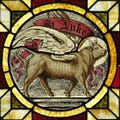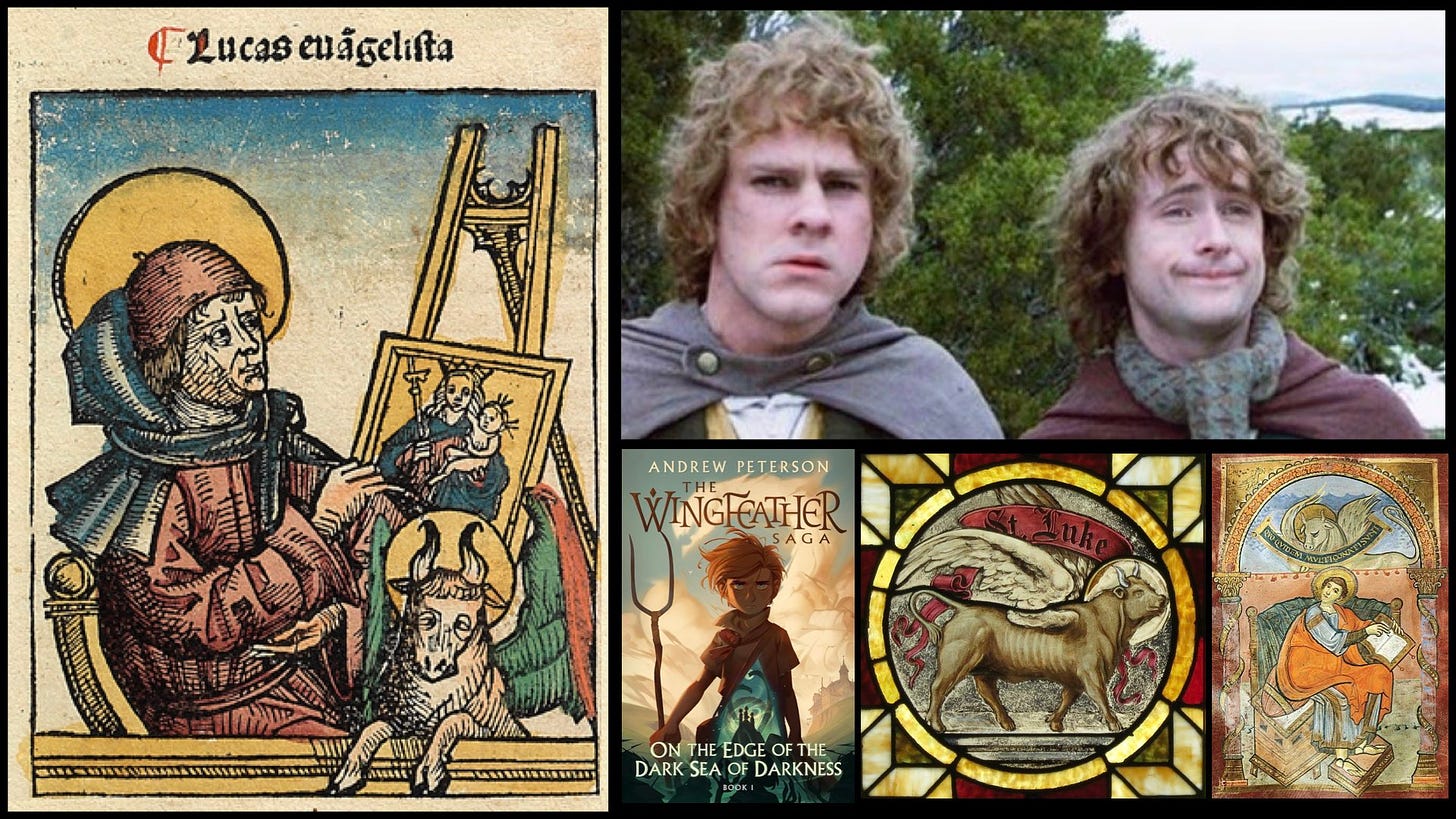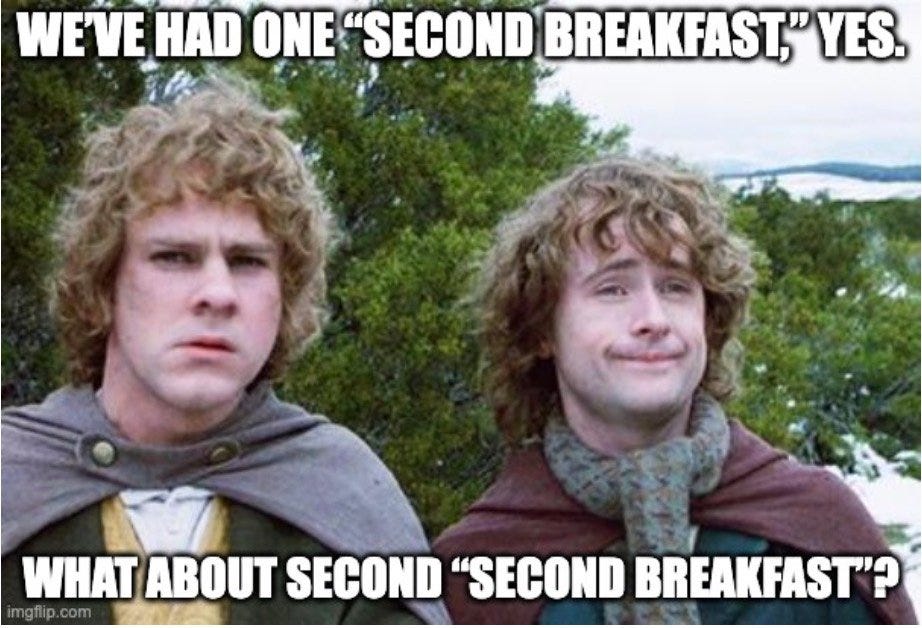Only now am I realising how Jazz Cow is a hero for our time. I hope to write once more about that before the fundraising Kickstarter closes on Friday next week. At the moment, it looks like Jazz Cow is not going to make it.
Dr Popp will win.
Is that what you want?
I don’t think it is. If you can kick in a few quid to help get the project moving, I’d be most grateful. Don’t forget, you are only charged if we hit the target. There’s a summary of the whole Jazz Cow project over here:
Right. Back to Cary’s Almanac, which has its own rhythms. Today, Luke the Evangelist:
At most of the wedding receptions I have attended, there have been three speeches. The father of the bride is followed by the groom and then the best man. Each will refer to the bride as she sits at the table with her new husband, beaming. Her father will portray her as his little girl who has grown up to be a princess. The groom will pay tribute to his beautiful bride and loyal companion. The best man will marvel at the competence and talent of the bride and wonder what on earth she is doing marrying a disaster like the groom.
Three speeches all describe recognisably the same woman, showing various aspects of her character and situation.
The gospels are like four speeches about Jesus. They do not contradict each other but clearly describe the same person with varying emphasis and tone. They illumine different aspects of the majesty and glory of Jesus.
Being a comedy writer, I have often been asked for advice on giving speeches. To the groom, I normally say that he needs no help. He will never have a better or easier audience than at his own wedding. He could read from an old phone book and sit down to rapturous applause.
To a best man, I normally issue a warning: play it safe. Unless you’re the brother of the groom, you’re an outsider. Most of the room don’t know you. They are worried you’re going to be rude, crass or unwittingly open up old family wounds. They are concerned you’re going to cause embarrassment. Don’t do this. It’s not about you. Be brief. Be nice. And sit down.
Luke the Outsider
Luke the Evangelist (‘Evangelist’ meaning ‘Gospel Writer’ in this context), remembered in the Church of England on 18th October, is like the best man. He’s an outsider. He was not one of the Twelve like Matthew and John. Mark was written in close collaboration with Peter. Luke was not an early follower of Jesus. In fact, he might even have been born a Gentile and converted to Judaism before following Christ.
Luke’s word can be trusted, however. He was close to the Apostle Paul and his travelling companion for some parts of his missionary journeys. In the Acts of the Apostles, there are a few passages which say ‘we’ rather than ‘they’. Luke, despite being an outsider, is an eyewitness of the early church.
But for anyone feeling isolated or excluded, Luke’s gospel is very good news. He shows Jesus’s concern for the poor, the lowly and the lonely. His nativity gives us humble shepherds on the hillside receiving the news of the birth of the Christ child. And it is only Luke who gives us the Parable of the Lost Sheep, showing how the shepherd goes after the lost.
Luke’s genealogy does not just show how Jesus is the Son of Abraham, father of God’s special people, the Jews. In Luke 3, the family tree stretches back to Adam, the father of everyone. Christ is the second Adam but is then almost immediately rejected by his own community becoming an outsider himself.
Supporting Roles
Luke brings us a plethora of supporting characters – probably more than the other three gospels. Some are dignified with being named like Zacchaeus (Luke 19), the loathed tax collector, prevented from seeing Jesus by the crowd. Outsiders like Zacchaeus often surprise us with their response to Jesus – and scandalise the crowd. In Luke 7, we hear of a centurion who is held up as an example as Jesus says to the crowd, “I tell you, I have not found such great faith even in Israel.” (Luke 7:9) The centurion is not named. But neither is the rich man in the story Jesus tells. This haughty rich man who treats the beggar like a servant, even in the afterlife, is not named. The beggar is called Lazarus.
Women are also brought to the foreground. Joanna, mentioned twice in Luke, is not named in any of the other gospels. We also meet Anna the prophetess in the Temple (Luke 2:36-38) Mary, when told of Jesus’s conception by the angel Gabriel says, “I am the Lord’s servant. May your word to me be fulfilled.” (Luke 1:38) Initially dubious, she gives a better response than Zechariah the priest in the Temple. He should have known better when he responds to the news of John the Baptist’s conception with “How can I be sure of this? I am an old man and my wife is well along in years.” (Luke 1:18). Moreover, note that Christ is not born of the priestly family in good standing, but of an unmarried woman.
Pull Up a Chair. Grab a Plate.
Whether you are an insider or outsider, there is a place for you at the table. Meals are crucial for Luke who includes 19 meals in his gospel, 13 of which are unique to his account. There are also parable about banquets.
It may seem an odd thing to focus on, but we really should take this seriously in a society in which cooking a meal from scratch for more than one is not normal. (Pasta in a jar of sauce doesn’t count). TV Dinners became microwave meals which became Deliveroo. Everyone can have anything they want at any time. Our desire for our own preferences can be satisfied. We get what we want. This does not make for a people who are able bear with one another. But that is what we, in the church, are called to do.
Now you can have ingredients delivered to your door in a small package, nestled in a box by a company like Hello Fresh. Everything has already been weighed and measured. Meanwhile, supermarkets devote more and more space to ultra-processed vegan food that is a substitute for highly processed meat and dairy products. Meanwhile, the area containing fresh ingerdients is getting smaller and smaller. How did we get here? And what are the consequences of the way we eat?
Meals are not merely for nourishment but fellowship and celebration. It’s why there is a meal at a wedding. Perhaps it feels like there’s just no time to share our tables and meals with anyone from outside our household. But our lack of time for hospitality is a choice we have made by default of other choices. Perhaps we got out of the hosting habit since Covid when four more horseman of the apocalypse stalked our land: fear; loneliness, despair; resentment. We need to fight back one home-cooked roast chicken at a time.
Second Breakfast
This is one of the appeals of the Lord of the Rings, which starts with hobbits, a people who take food seriously. Second breakfast is no laughing matter. I don’t much want to go to Gondor. But the Shire sounds rather appealing.
It’s one of the reasons that Andrew Peterson’s Wingfeather Saga is so compelling, especially for young people who are still looking for the comforts of home as they dip their toe into thrilling adventure. Peterson describes the meals so evocatively, you can almost smell the homecooked food as you turn the pages. You want to be there. Which means you will be with them.
The Lord may have put eternity in our hearts. He also put fellowship in our stomachs.
This is why we celebrate a meal on the Lord’s Day. If there is one verse missing in Luke’s masterpiece, it would be the one from Revelation 3:20.
Behold, I stand at the door and knock. If anyone hears my voice and opens the door, I will come in to him and eat with him, and he with me.
This St Luke’s Day, why not come up with a plan to have people round for dinner? Or lunch? Or even a shared sandwich on a park bench? And don’t just invite the usual suspects. Invite some outsiders. It will probably be more fun than you think. And if it isn’t, you’ll have something to talk about the next time you do it.
And you could always go out of your way to learn someone’s name at Church. There’s always someone you recognise but don’t know their name, why not barrel up to them, in the spirit of St Luke, and reintroduce yourself and catch their name? Maybe even write it down. (Not in front of them. That’s weird). But you’d remember it if you invited them to dinner.
If you enjoyed this, why not subscribe? All that means is putting in your email address so that every instalment is emailed to you when it drops, normally before lunch on Friday. It’s free. Just bang in your email address and allow the Almanac to bring order to your life, and keep you on track:
If you’ve already subscribed - thank you! It would be a great help if you could spread the word since social media is geared to stopping bloggers from doing that now. Dr Popp is closing in. So if you could email a friend, or message someone a link to this blog, I’d be most grateful. And they might be too:
Wanna hear me talk about situation comedy for a whole hour with Reformed Mythologist Nate Morgan Locke? You’re in luck:






Our household is a big fan of second breakfast. Our grandchildren have weetabix and banana upon waking, then by the time we’re ready for our breakfast, well brunch, they’re ready for beans on toast! Both are opportunities for chats and bonding, mostly because the kids eat sooooo slooowly.